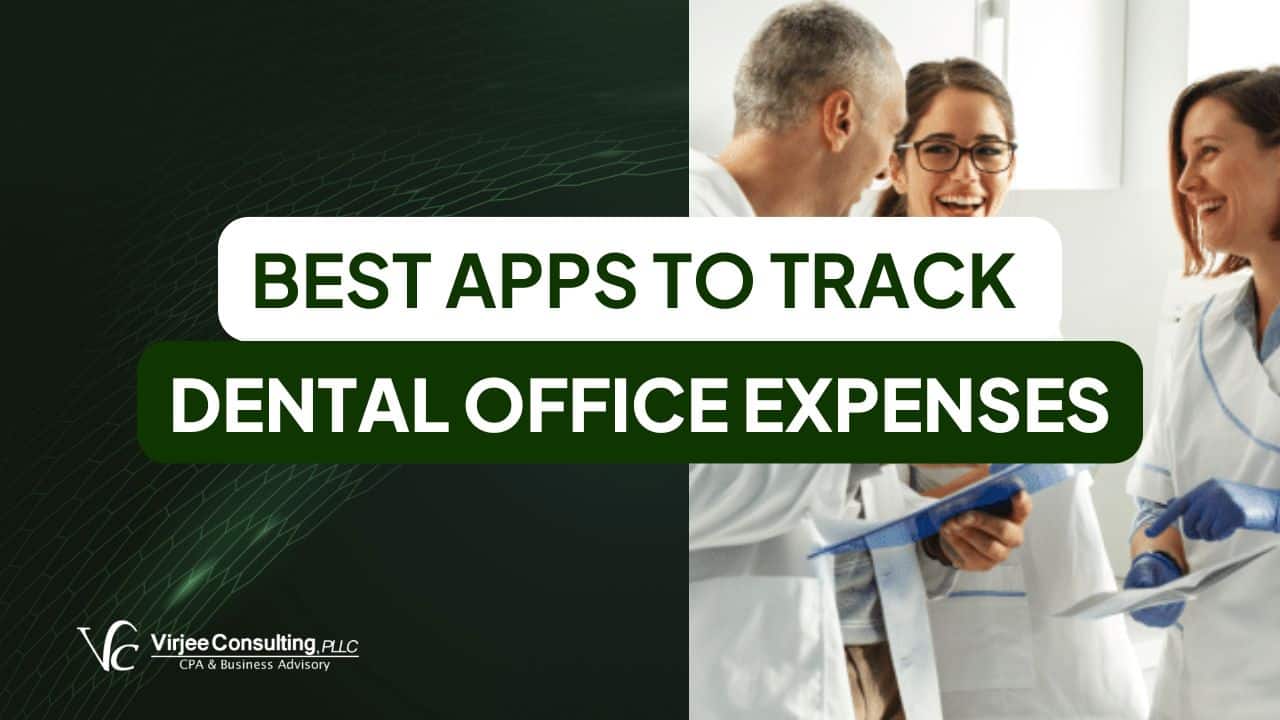Running a profitable dental practice involves more than excellent patient care; it’s also about keeping a close eye on business finances. Using Apps to Track Dental Office Expenses can help you manage costs from dental equipment and supplies to utilities, staff benefits, and technology, preventing expenses from piling up quickly.
The good news is that modern accounting software and Apps to Track Dental Office Expenses make expense tracking almost effortless. Mobile apps let you snap receipts on the go, automate recurring payments like rent and utilities, and reconcile bank transactions with just a few clicks, saving hours of manual work.
So the key isn’t about finding apps to track dental office expenses; it’s about how well it fits into your dental practice workflow, how it analyzes and reports on your finances in a way that gives you clarity.
What to Consider
With so many accounting software in the market with seemingly similar features, how do you choose? That’s a great question, and one we commonly get asked.
Here are some considerations to look at:
Integration with your dental workflow
Your dental practice runs on your Practice Management System (PMS) so whatever apps you add should fit easily into your technology ecosystem; otherwise, you end up with data in silos and additional manual work.
Some Apps to Track Dental Office Expenses integrate seamlessly with various practice management systems (PMS), reducing duplicate data entry and giving you a clearer picture of revenue versus costs.
Reporting and analytics
Look for tools that let you break down expenses by location, provider, or category. It should be able to produce financial reports that are easy to interpret, so that you can make informed and timely decisions.
Scalability and user access
If you have a multi-location practice, then ideally you’ll want software that allows unlimited users or flexible access tiers without inflating costs.
Ease of use and interface
The last thing you want is hours of training before your team can use a system. Apps to Track Dental Office Expenses with intuitive dashboards can save busy dental teams hours each month, reduce errors, and make financial management far less stressful. For guidance on funding your practice and understanding loan options, see Everything You Need to Know About SBA Loans for Dental Practices.
Our Top Apps for Tracking Dental Office Expenses
Now that we know what we’re looking out for. Let’s jump in to see our top picks for the best accounting software for dental practices in 2025.
QuickBooks
QuickBooks is a household name in small business accounting. It’s one of the most popular choices among dental CPAs thanks to its robust features and strong integration ecosystem.
What to know:
- Offers detailed reports for expense categories such as dental supplies, lab costs, equipment, and facility expenses
- Supports integration with common PMS tools
- Starts at $19/ month. Fixed number of users depending on subscription tiers
Best for: Practices of any size, especially those working with a CPA who already uses QuickBooks.
Xero
Xero is a popular alternative to QuickBooks with a minimalistic, user-friendly interface. It’s particularly appealing for practices with multiple locations or owners who prefer intuitive dashboards.
What to know:
- Tracks expenses by category, vendor or location for better cost analysis.
- Supports integration with certain PMS tools
- Starts at $20/ month. Offers unlimited users on all plans.
Best for: Practices wanting a clean interface, easy multi-location reporting, and flexibility in the number of users.
Sage Intacct Cloud Accounting
Sage Intacct Cloud Accounting is a cloud-based solution that balances affordability with solid accounting features. It’s also HIPAA compliant out-of-the-box, which could be a requirement for internal governance of large dental practices.
What to know:
- Tracks expenses by category, supplier, or project—ideal for monitoring equipment, consumables, and overhead costs.
- Pricing not available online
- HIPAA compliant
Best for: Large dental practices that require compliance with HIPAA governance.
FreshBooks
FreshBooks is an intuitive and affordable accounting platform ideal for solo dentists or small practices. It’s easy to learn and quick to set up with strong expense tracking and invoicing features.
What to know:
- Tracks expenses by category and attaches receipt images.
- Automates recurring expense entries
- Simple reporting for small-scale operations
- Starts from US$6.50/ month (2 users) for businesses
Best for: Solo dentists or very small practices just getting started.
Zoho Books
Zoho Books is a cost-effective accounting solution that offers automation capabilities. It has a free tier that’s attractive for practices that are just starting out and want a software with pricing tiers that scale with them.
What to know:
- Tracks and categorizes expenses across multiple branches.
- Automates recurring bills and payments.
- Free tier available with limited features.
- Custom dashboard and reporting only available on higher tiers
Best for: Cost-conscious practices that are just starting out
What You Can Do Next
We hope you now have a clearer idea of what to look for when choosing Apps to Track Dental Office Expenses for your practice. The right tool should provide clarity on where your money is going and help keep your finances in top shape.
Once you’ve made your shortlist of tools, get a demo. Remember to ensure that your questions regarding connectivity with your PMS tool are answered, and that the dashboards and reports align with what you’d like to see.
If you’re running a large dental practice or thinking of migrating from one tool to another, we can help you through this transition. At Virjee Consulting, we work with dental practices nationwide to streamline their accounting, payroll, and taxes.
Book a time in the form below.
Let’s make financial management easier and far less stressful for you.

